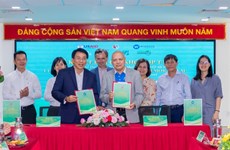Dong Thap moves to preserve Tram Chim Park
The People’s Committee of the Mekong Delta province of Dong Thap has
freshly approved a funding of 208 billion VND to preserve and develop
Tram Chim National Park sustainably in 2013-2020.
The People’s Committee of the Mekong Delta province of Dong Thap has
freshly approved a funding of 208 billion VND to preserve and develop
Tram Chim National Park sustainably in 2013-2020.
It aims to preserve cajeput forests and submerged grassland and protect rare species of flora and fauna, especially red-headed cranes, and set up a management system in the park.
Located in Tam Nong district, Tram Chim National Park boasts a rich biodiversity that turned it into the world’s 2000th Ramsar site in 2012.
Established in 1985, the 7,313-hectare Tram Chim became a national park in 1998 and then the fourth Ramsar site in Vietnam.
The park’s plentiful green vegetation is inhabited by more than 130 species of higher plants featuring six main types of floristic societies.
Water life in the park is also bustling seeing the presence of over 150 species of freshwater fish, with some listed in Vietnam’s Red Book like clown feather-back fish, common archerfish and giant barbs, nearly 180 algae species, 26 epifauna species, 350 species of plankton and 34 species of amphibian.
Tram Chim is home to 198 bird species, including 16 rare ones such as red-headed cranes, black-faced spoonbills, black eagles, great-billed herons and spotted-billed pelicans. It was recognised as an important bird sanctuary in Vietnam.
The diversity is largely attributable to the physical feature of the park which lies in the low-lying area of Dong Thap Muoi (Plain of Reeds) and benefits vastly from the flood cycle generated by the Mekong River .
Providing a perfect habitat for hundreds of flora and fauna species, the park also offers an ideal destination for ecotourism in Dong Thap Muoi.
To preserve the park, a number of projects jointly developed by local authorities and state and international agencies have been launched to reduce local residents’ dependence on the park and raise their awareness of protecting its environment.
Local residents have been encouraged to get involved in managing natural resources offered by the park and utilising them in a sustainable manner.-VNA
It aims to preserve cajeput forests and submerged grassland and protect rare species of flora and fauna, especially red-headed cranes, and set up a management system in the park.
Located in Tam Nong district, Tram Chim National Park boasts a rich biodiversity that turned it into the world’s 2000th Ramsar site in 2012.
Established in 1985, the 7,313-hectare Tram Chim became a national park in 1998 and then the fourth Ramsar site in Vietnam.
The park’s plentiful green vegetation is inhabited by more than 130 species of higher plants featuring six main types of floristic societies.
Water life in the park is also bustling seeing the presence of over 150 species of freshwater fish, with some listed in Vietnam’s Red Book like clown feather-back fish, common archerfish and giant barbs, nearly 180 algae species, 26 epifauna species, 350 species of plankton and 34 species of amphibian.
Tram Chim is home to 198 bird species, including 16 rare ones such as red-headed cranes, black-faced spoonbills, black eagles, great-billed herons and spotted-billed pelicans. It was recognised as an important bird sanctuary in Vietnam.
The diversity is largely attributable to the physical feature of the park which lies in the low-lying area of Dong Thap Muoi (Plain of Reeds) and benefits vastly from the flood cycle generated by the Mekong River .
Providing a perfect habitat for hundreds of flora and fauna species, the park also offers an ideal destination for ecotourism in Dong Thap Muoi.
To preserve the park, a number of projects jointly developed by local authorities and state and international agencies have been launched to reduce local residents’ dependence on the park and raise their awareness of protecting its environment.
Local residents have been encouraged to get involved in managing natural resources offered by the park and utilising them in a sustainable manner.-VNA













